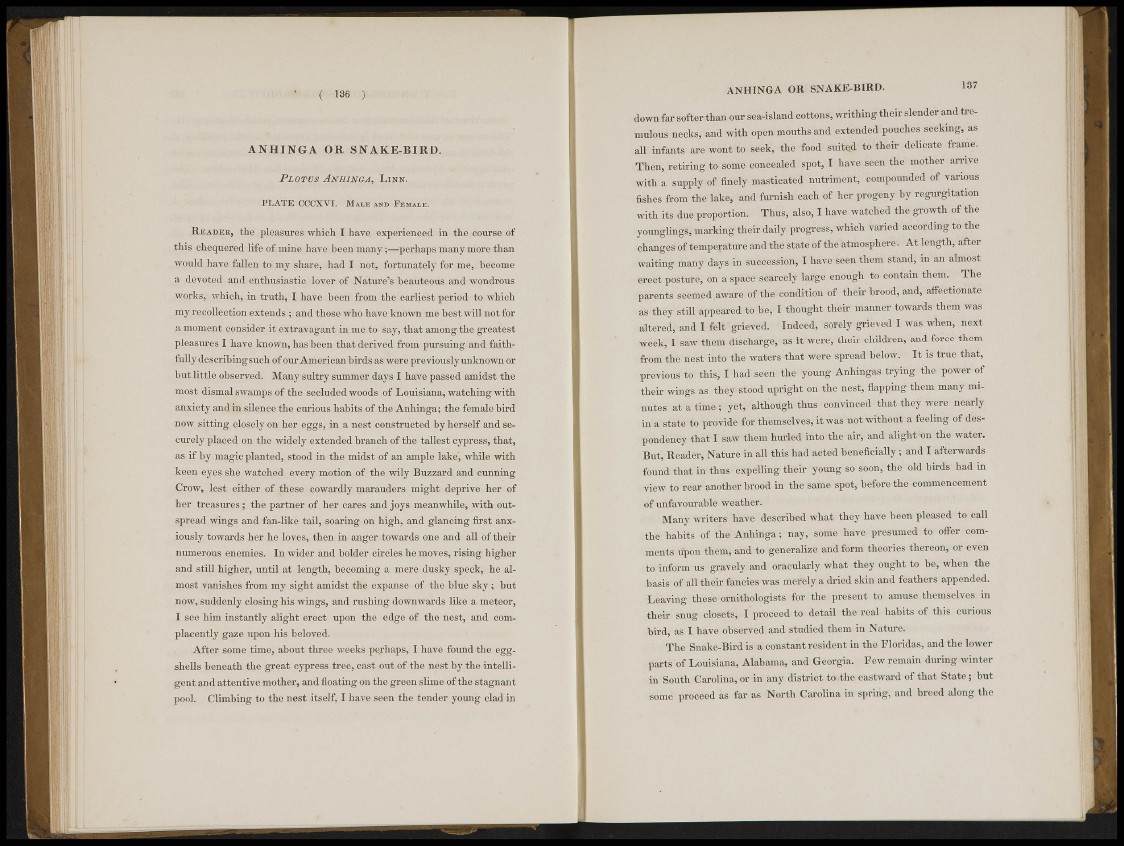
( 136 »}J
A N H I N G A OR SNAKE-BIRD.
I'r.orrs ANHINGA, Link.
IT. ATE CC.'CXVl. MALE AND Fkmai.K.
Kkadkb, the pleasipes which I have experienced in the course of
this i-lii'i|Uorocl life of »lino have been :riarni;£—perhaps nnuiy more than
would have fallen to. my share, had I not,, fortunately for lmy become
8 .devoted .and enthusiastic lover of Nature's beauteous ancj'twondi'ons
works, which, in truth, I have been from the'«ai l i t period to which
my recollection extends; and those who have known mo best will not for
a moment consider it extravagant in me to say, tlmt among the greatest
pleasures I have known, has been that derived from pursuing and faithfully
describingsuqh of our American birds as were previously unknown or
but little; observed. Many sultry summer days I have passed amidst the.
most dismal swamps of the secluded woods of Louisiana, watching with
anxiety and in silence the curious habits of the Anhinga; the female bird
now sitting closely on her eggs^ in a nest constructed by herself and securely
placed on the widely extended branch of the tallest cypress, that,
as if by magic planted, stood in the midst of an ample lake", while with
keen eves she watched fiswy motion of the wily Buzzard and cunning
Crow, lest either of tlic.se cowardly marauders might deprive her of
her treasures: the partner of her cares and joys meanwhile, with outspread
wings and fan-like tail, soaring on high, and glancing first anxiously
towards her he loves,, then in anger towards one and^l ©f their
numerous enemies. In wider and bolder circles he moves rising higher
and still higher, until at length, becoming a mere dusky speck, he almost
vanishes from my sight amidst the expanse - of the blue sky; but
now, suddenly closing his wings, and rushing downwards like a meteor,
I see him instantly alight erect upon the edge of the nest, and complacently
gaze upon his boloved.
After some time, ahout three weeks perhaps, I have found the eggshells
beneath the great cypress tree, cast out:of the nest hy the intelligent
and attentive mother, and floating on the green slime of the stagnant
pool. Climbing to the nest itself, I have seen the tender young clad in
ANHINGA OR SNAKE-BIRD. 137
down far softer than our seaMand cottons, writhing their slender and tremulous:
neaks, and with open mouths and extended pouches seeking, as
all infants are wont to seek, the food suited to tlioir delie«® frame.
Then, retiring to some concealed spot, I have soon the mother arrive
with a supply of' finely masticated nutriment;'' compounded of various
fishes from the lake, and furnish eaeli of her progSny hy régurgitation
with its; due proportion. Thus, also, I have watched the growth of the
younglings, marking their daily progress, which varied according to the
changes of temperatifi-e®4d"the state of the atmosphère. At length, after
waiting many days in succession, I have seen them stand, in an almost
erect postare, on a «pace scarcely large enough to contain t&Blie The
parents seemed aware of the condition of their brood, and, affectionate
as they still appeared to be, I thought their manner towards them was
altered, and I fi-lt'gricved. Indeed, sorely grieved I was when, next
week, I saw them discharge, as it were, their children, and force them
from the nest into the waters that were spread below. It is true, that,
previous to. this, I had seen the young Anhihgas trying the power of
their wings as they stood upright on the nest, flapping them many minutes
at a time,;,, yet, although thus 'Convinced that they were nearly
in a state to provide for themselves, it was not without, a feeling of despondency
that I saw thoni hurled iiito the air, and alight'On the water.
But, Reader, Nature in all this had acted beneficially ; and I afterwards
found that in thus expelling their young so Soon, the old birds had in
view to roai- another brood in the same; spot, before the commencement
'Of unfavourable weather.
Many writers have described what they have been pleased to call
the habits of the Anhinga ; nay, some have presumed to offer comments
upon them, and to generalize and form, theories thereon, or even
to inform us gravely ; and oracularly what they ought to be, when the
basis of all their fancies was merely a dried skin and feathers appended.
Leaving these ornithologists for the present to amuse themselves in
their snu|; closeisî, f proceed to detail the real habits of this curious
bird, as I have dbseSved and studied them in Nature.
' :The Snake-Bird is a constant resident in the Floridas, and the lower
parts of Louisiana, Alabama, and Georgia. Few remain during winter
in South Carolina,or in any district to the eastward of that State; but
some proceed as far as North Carolina in spring, and breed along the